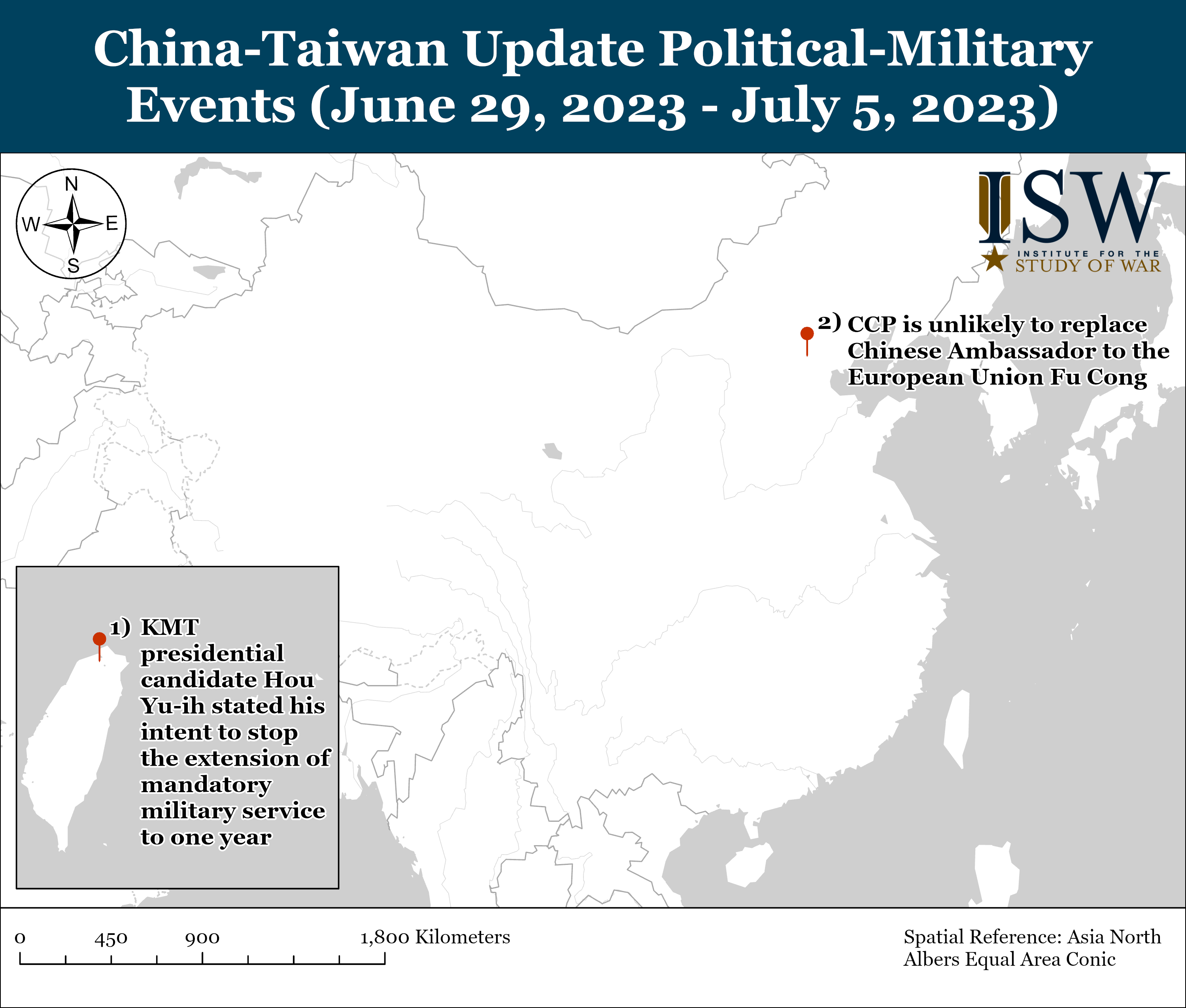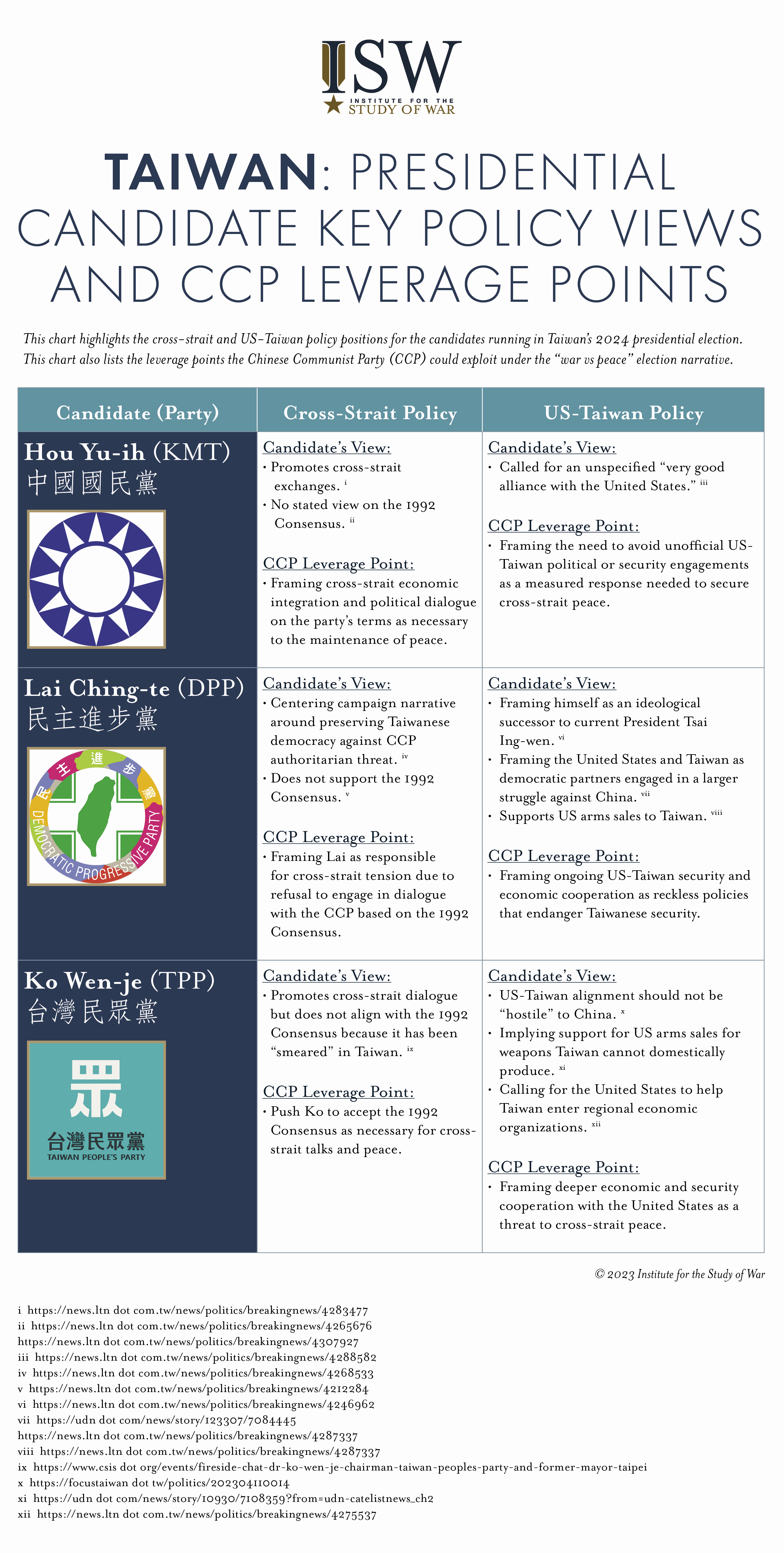Authors: Nils Peterson of the Institute for the Study of War
Editors: Dan Blumenthal and Frederick W. Kagan of the American Enterprise Institute
Data Cutoff: July 4 at 9AM ET
The China–Taiwan Weekly Update focuses on Chinese Communist Party paths to controlling Taiwan and relevant cross–Taiwan Strait developments.
Key Takeaways
- KMT presidential candidate Hou Yu-ih stated his intent to stop the extension of mandatory military service to one year, likely exacerbating existing CCP leverage points targeting the DPP under the dominant but contested “war versus peace” election narrative.
- The CCP publicly qualifies comments from Chinese Ambassador to the European Union Fu Cong about Ukraine reclaiming its 1991 borders and is unlikely to replace Fu Cong.
Taiwan Developments
This section covers relevant developments pertaining to Taiwan, including its upcoming January 13, 2024 presidential and legislative elections.
Elections
The Taiwanese (Republic of China) political spectrum is largely divided between the Democratic Progressive Party (DPP) and the Kuomintang (KMT). The DPP broadly favors Taiwanese autonomy, Taiwanese identity, and skepticism towards China. The KMT favors closer economic and cultural relations with China along with a broader alignment with a Chinese identity. The DPP under President Tsai Ing-wen has controlled the presidency and legislature (Legislative Yuan) since 2016. This presidential election cycle also includes the Taiwan People’s Party (TPP) candidate Ko Wen-je who frames his movement as an amorphous alternative to the DPP and KMT. It is normal for Taiwanese presidential elections to have third party candidates, but none have ever won. The 2024 Taiwan presidential and legislative elections will be held on January 13, 2024 and the new president will take office in May 2024. Presidential candidates can win elections with a plurality of votes in Taiwan.
Terminology: 1992 Consensus: a disputed cross-strait policy formulation supported in different formations by the CCP and KMT that acts as a precondition to cross-strait dialogue. The DPP does not support the 1992 Consensus.
KMT presidential candidate Hou Yu-ih stated his intent to stop the extension of mandatory military service to one year, likely exacerbating existing CCP leverage points targeting the DPP under the dominant but contested “war versus peace” election narrative. Mandatory male military service in Taiwan is currently four months long.[1] Hou stated he would limit the period of mandatory military service to four months to “ensure stability and peace on both sides of the strait.”[2] This would undo President Tsai Ing-wen’s extension of male conscription to one year beginning in 2025.[3] Her decision to extend conscription garnered a majority of societal support but remains a political topic for internal Taiwanese debates on the contributing factors of cross-strait tensions.[4] Hou’s rhetoric links the extension of Taiwanese military service as a driver of cross-strait tensions. His comments also place the onus for reducing cross-strait tensions on Taiwan without accounting for the coercive activities that prompted the conscription reform, such as the PLA escalating violations of Taiwan’s ADIZ since 2020.[5] Hou’s comments contribute to the framing of the Taiwanese election as a choice between peace and war, a narrative that ISW previously assessed provides the CCP with leverage points to influence Taiwanese cross-strait policy.[6] This creates opportunities for the CCP to plant information narratives both domestically in Taiwan and internationally that exculpate the party from blame for cross-strait tension and lay that responsibility at the feet of the DPP.
China Developments
This section covers relevant developments pertaining to China and the governing Chinese Communist Party (CCP).
The CCP publicly qualifies comments from the Chinese Ambassador to the European Union Fu Cong about Ukraine reclaiming its 1991 borders and is unlikely to replace Fu Cong. Fu Cong stated that he “didn’t see why not” Ukraine should reclaim its 1991 territorial borders during an interview with Al Jazeera in late June.[7] The Chinese state media outlet Global Times published an article claiming that unspecified Western media aimed to use Fu’s comments out of context as a means to sow discord between China and Russia.[8] Chinese Foreign Ministry Spokeswoman Mao Ning responded to a question about whether Fu Cong’s comments represented the People’s Republic of China’s official position by stating that China wants all parties in the Ukraine crisis to reach a political settlement via negotiation.[9] Fu Cong’s remarks are the second time a high-ranking Chinese official in Europe has strayed from Beijing’s official line on Ukraine as articulated by Mao Ning. In April 2023, Chinese Ambassador to France Lu Shaye dismissed the sovereignty of former Soviet republics.[10] Mao Ning subsequently repudiated Lu’s comments by claiming that China “respects all countries’ sovereignty, independence, and territorial integrity.”[11] Despite rumors of his removal, Lu Shaye still serves as Chinese Ambassador to France.[12]
Neither Xi nor any Politburo Standing Committee member has publicly made international calls or remarks in response to Fu’s comments. This differs from China’s response to Lu’s comments, after which CCP General Secretary Xi Jinping called Ukrainian President Volodymyr Zelensky to mitigate the associated diplomatic fallout in Europe.[13] Keeping Fu Cong’s comments out of public conversation also avoids any high-profile international calls, which plays to the CCP’s advantage in terms of its economic relationship with Europe. Drawing attention to Fu Cong’s comments could risk undermining German and French alignment with Chinese views about avoiding economic disengagement.[14]
[1] https://focustaiwan dot tw/politics/202212270009 FOOTNOTE
[2] https://udn dot com/news/story/123307/7275541
https://www.taiwannews dot com.tw/en/news/4935084
[3] https://www.taiwannews dot com.tw/en/news/4762872#:~:text=TAIPEI%20(Taiwan%20News)%20%E2%80%94%20President,1%2C%202024.
https://www.reuters.com/world/asia-pacific/taiwan-extend-compulsory-mili...
[4] https://focustaiwan dot tw/cross-strait/202302170016#:~:text=By%20age%20group%2C%20the%20policy,it%20and%207.8%20percent%20abstained.
https://www.taiwannews dot com.tw/en/news/4868434
[7] https://www.aljazeera dot com/news/2023/6/27/dont-see-why-not-china-envoy-on-backing-ukraines-91-borders
[8] https://www.globaltimes dot cn/page/202306/1293322.shtml
[9] https://www.fmprc dot gov.cn/fyrbt_673021/202306/t20230628_11104988.shtml
[10] https://www.fmprc dot gov.cn/mfa_eng/xwfw_665399/s2510_665401/2511_665403/202304/t20230424_11064804.html
https://www.wsj.com/articles/china-seeks-to-calm-storm-over-ambassadors-ukraine-remarks-6213f3fb
[11] https://www.fmprc dot gov.cn/mfa_eng/xwfw_665399/s2510_665401/2511_665403/202304/t20230424_11064804.html
[12] https://std.stheadline dot com/sc/daily/article/2533003/%E6%97%A5%E5%A0%B1-%E6%B8%AF%E8%81%9E-%E9%A7%90%E6%B3%95%E5%A4%A7%E4%BD%BF%E7%9B%A7%E6%B2%99%E9%87%8E%E5%B0%87%E8%BF%94%E5%9C%8B-%E6%8E%A5%E6%8E%8C%E5%B0%8D%E5%A4%96%E5%8F%8B%E5%8D%94
[13] https://www.president dot gov.ua/en/news/vidbulasya-telefonna-rozmova-prezidenta-ukrayini-z-golovoyu-82489
https://www.fmprc dot gov.cn/mfa_eng/zxxx_662805/202304/t20230426_11066785.html
[14] https://mp.weixin dot qq.com/s/oqgqFnhbOvQzHqF1DcJn8g?utm_source=substack&utm_medium=email
https://www.reuters.com/world/companies-rather-than-countries-must-de-ri...
https://www.reuters.com/world/chinas-premier-tells-german-ceos-biggest-r...
https://www.reuters.com/world/europe/between-reset-de-risk-eu-leaders-pa...
http://cpc.people dot com.cn/n1/2023/0623/c64094-40019619.html
https://www.gov dot cn/yaowen/liebiao/202306/content_6887894.htm


